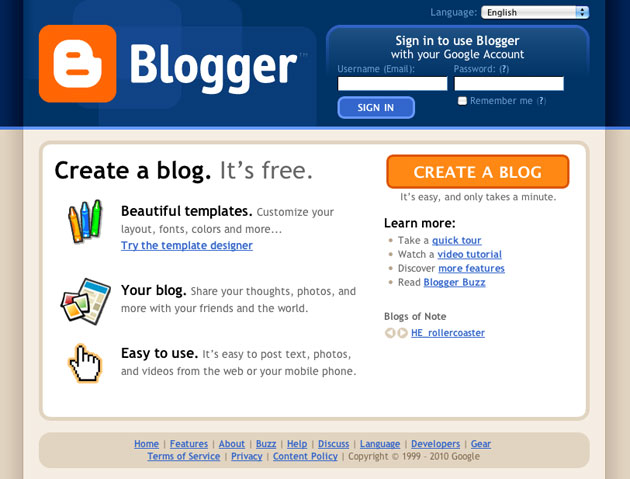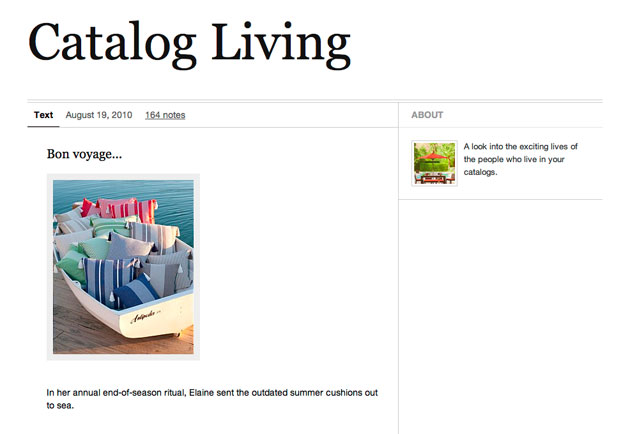Shut Up and Blog Already
September 2010
By The Author

You know you should do it. You know other people who do, and they make it look so easy. And yet you can’t think of anything more intimidating than staring at a blank page and a blinking cursor.
You can find reasons all day long to rationalize why you haven’t yet started your own blog, but none of those justifications are going to help your business grow.
It’s time to stop being your own worst enemy and start understanding why the excuses that are holding you back are all in your head.
1. I’m not a writer.

So you’re not a writer – at least not by trade. Big deal! Neither are many very successful bloggers. They’re entrepreneurs, artists, community activists, foodies, moms and even CEOs. Instead, what they have in common is passion.
Always keep in mind that what you have to say is far more important than the mechanics of how you say it.
A blogger’s purpose first and foremost is to entertain and engage. If your punctuation is less than perfect or your sentence structure leaves something to be desired, no one is going to report you to the grammar police. But if there is no conviction behind your words, no one is going to invest their time in reading your blog week after week.
Your writing style should be easy and informal. Don’t approach the task of creating a post like you’re writing a research paper. Instead, imagine you’re sitting down to dash off a quick e-mail in response to someone who has asked you a question about your chosen topic. Keep your entry brief and conversational. When you’ve finished writing, read your post aloud to yourself. If you trip over words or phrases because they feel unnatural or clunky, go back and simplify them.
Always keep in mind that what you have to say is far more important than the mechanics of how you say it. No one is grading your blog with red pen in hand. Authenticity and personality count far more than perfection any day of the week. Just loosen up and let your own voice come through. Not only will this make your writing more approachable, it’s the very foundation of building credibility and trust. After reading one post, your readers should feel as if they’ve met you; if they continue to follow your blog over time, they should feel as though you’re a familiar friend.
2. I’m not a designer or a programmer.

Stop right there. Nope – not another word.
Can you use a word processor? Can you open a web browser window? Can you attach a file or a picture to an e-mail? If you answered “yes” to all three of these questions, then congratulations, my friend, you have all the technical and artistic know-how you need to be a blogger!
There’s no reason to let technophobia hold you back from reaping the benefits of blogging – not when you can take advantage of user-friendly, do-it-yourself tools like Google’s
Blogger.

Blogger is designed to give anyone the power to publish. The interface is so intuitive and easy to navigate that you can have your blog up and running in just minutes, and best of all, it won’t cost you a dime. Simply choose from an assortment of templates, select your preferred combination of colors and fonts and away you go.
Creating posts is easy, too, and you can even enhance them with links, photos and video. You also can assign each article to a subject category of your choosing to help your readers find related content according to their specific interests.
Of course, you’ll get an even greater return on your time and effort if your blog is hosted on your own website, since your visitors can read your latest entries and peruse your archives without ever leaving your primary site. Still, there’s no cause for concern. Simply partner with a good web development firm like
Fame Foundry that can help you integrate your blog into your existing website in a way that’s consistent with your brand and provide a content management system that’s just as easy to use as any of the free do-it-yourself tools.
No matter which approach you choose, you’ll be surprised to find how simple it is to get your blog up and running and how little time it takes to publish new content.
3. I wouldn’t know where to begin.

One of the best things about blogging is the fluidity and flexibility of the medium. As a blogger, you are your own writer, editor and publisher. That means that there are no hard-and-fast rules to which you must adhere. Think of your blog as a blank canvas that’s waiting for you to add color, shape and texture.
As a blogger, you are your own writer, editor and publisher.
There are many different ways you can approach blogging – each one of them just as valid as the next. You might choose to use your blog as a platform for reporting industry news and forecasting trends, for providing useful advice and how-tos or for journaling your personal experiences in order to help others who are trying to achieve similar goals. Some very popular blogs like
Catalog Living are nothing more than an ongoing series of images with funny captions.

One of the best ways to get started is not by writing at all. Instead, it’s by reading. If you’re seriously considering starting your own blog, you should make a point of reading other blogs every day – blogs that talk about subjects that relate to your business and industry, blogs written by your competitors and even blogs that have nothing to do with your particular field but that you find enjoyable and entertaining regardless of the subject matter.
Subscribe to the RSS feeds for these blogs and set aside a few minutes each day to scan through the latest posts. You don’t need to read every entry, just the ones that strike you as most interesting.
Look for commonalities among the blogs you read daily for pleasure. What do you enjoy about them most? When you find an article that you can’t stop reading, take a moment to analyze why it is so compelling. Is it the writer’s voice, their unique approach to their chosen topic or the way they’ve organized their argument? Pay attention as well to the headlines that catch your eye and think about what makes them captivating. Over time, as you assimilate these observations, you will achieve clarity about what you want your blog to be and how to craft posts that will keep your readers hooked.
4. I don’t have time.

Blogging is a medium created by and for the
culture of the Web, which is one in which attention is always at a premium. As a result, it is the ideal information exchange platform for the time-starved – both writer and reader.
Blogging is not an exercise in filling up a page. Your job is to take one very narrowly defined topic and put your unique stamp on it.
Blogging is not an exercise in filling up a page. More than newspapers, more than magazines and more than trade journals, blogging is about specificity. Your job is to take one very narrowly defined topic and put your unique stamp on it.
Some of the best, most powerful blog posts are also the shortest. At Fame Foundry, one of our favorite bloggers is
Seth Godin.

His entries are rarely more than five or six brief paragraphs in length (some are as brief as five sentences), but every last one of them hits home. We are devoted followers of his blog because we know that in exchange for just a few minutes of our time each day, we’ll walk away with profound insights that inspire us or reinforce our belief in the way we do business.
Blogging is not your full-time job, nor should it be, so follow Seth’s example. Use the time you do have to string together a few sentences, but make each one of them count. Keep your topics focused and your points sharp. Short, compelling posts will make your work as a blogger manageable while keeping your readers coming back for more.
Also, remember that writing is like running. The first time you strap on a pair of shoes and hit the pavement, every step is painful and every breath is labored. But the more you do it, the more effortless it becomes. Whereas once you might have thought you’d never complete a full lap around the block, soon you’re taking on a 5k as though you’ve been a runner all your life.
The same principle holds true for writing. With practice, you’ll get better and faster. It might take you two or three hours to write your first entry, but once you get a few under your belt, you’ll find you can crank out a post in just an hour, half an hour or even 20 minutes. The creative process that at first feels arduous and awkward will soon become routine and, believe it or not, even enjoyable.
5. I don’t have anything interesting to say.

Don’t think of your blog as a podium; think of it as the microphone at the center of a town hall meeting. You aren’t there to deliver a monologue; you’re there to start the conversation. Your job is not to sell; it’s to educate, inform, entertain, excite and provoke thought while leaving room for others to join the discussion.
Here’s a piece of age-old writing advice: Write about what you know.
When you write about what you know, you’ll write with passion and authority. Your writing style will be more natural and conversational, not like you’re writing a term paper. You’ll have the confidence to make big, bold statements, and you’ll never run out of things to say.
Here’s a piece of new-age blogging advice: Write about what you know, but do it in a way that’s different from anyone else. With hundreds of millions of blogs in the world, it’s likely there are many others that cover the same general subject matter as yours will. What will set you apart is the way you apply your unique cache of experience, expertise and perspective to that subject to create original content that is useful and interesting to your readers.
Let’s say you run a bakery. Baking is a science, and you are an expert in that science. As a result, you have a limitless source of material. How many people understand the fundamentals of baking a basic pie crust? How many would love to know how to make use of that bread machine that’s been collecting dust in the cabinet since their wedding shower? Are there other blogs in the world about baking? Of course. But none of them have your distinct voice, your particular experience and your individual point of view.
Maybe you own the neighborhood coffee shop. Nowhere is it written in stone that you must write about coffee. Your blog could be about the neighborhood you serve – what’s going on, the issues people are concerned about and the events that are happening around you. For you, a post could be nothing more than a collection of photos from the neighborhood chili cook-off. Does that have anything to do with what you sell? Nope! Are people interested in it? You bet! The loyal local following you could build with this type of blog is something that even Starbucks or Dunkin' Donuts would envy.
6. I can’t come up with enough good ideas to keep it going.

If you sit down in front of a blank page and wait for great ideas to come, chances are, they won’t. You’ll just find yourself staring at the cursor, anxiety building as the minutes tick away. Instead, to be a successful blogger, you should be constantly mining the world around you for inspiration.
Just as reading other blogs can help you develop your voice and sharpen your point of view, it is also a bottomless wellspring of creative fuel.
To be a successful blogger, you should be constantly mining the world around you for inspiration.
As you browse through your RSS feeds, you might come across an article that you disagree with completely. Why not share your take on the subject? Or perhaps you stumble upon an interesting observation and find a way to tailor it to be relevant and relatable for your particular audience. You might even find ideas spread across four or five different articles that you can weave together into a comprehensive how-to guide for your readers.
No matter the source, you’ll likely find that inspiration rarely strikes at your convenience, when you have time to sit down and write a post. To make sure you never let a good idea go to waste, keep a running idea log. This doesn’t have to be anything formal – just a simple text file or even a handwritten journal will do. The most important requirement is that it can be kept within easy reach at all times.
Jot down any and every idea as it comes to you, even if it’s not fully developed. Include the link to the article that inspired you and make a few basic notes about what you want to say on the subject to help jog your memory later. When it comes time to write your next post, simply choose a topic from the list and pick up where your notes left off. You’ll never find yourself wasting your precious blogging time just hoping and praying to land on a great idea.
7. No one will read it anyway.

For a while, it might feel like you are talking to an empty room. You’ll be tempted to throw your hands up and quit, but don’t.
Persistence is your friend. Successful bloggers stick it out.
You must begin with reasonable expectations and realize that it might take a year or more to build a following. However, even while your readership is low, your efforts are not in vain.
Persistence is your friend. Successful bloggers stick it out.
Think of your initial weeks and months of writing as laying the foundation for your blog. Your first entries will be fundamental in establishing who you are and what you stand for. You’ll likely find yourself referencing these foundational posts again and again, and by linking back to older articles, you’ll encourage new visitors to delve into your archives and see what else they might have missed.
It’s also important to understand that your job is not done when you hit the publish button. Traffic building is just as much a part of blogging as research and writing. Post links to your latest content on social networks like Facebook and Twitter. Also be sure to include social media badges on your posts to make it easy for your readers to share content that they like with their friends and followers.
Another way to bring more eyes to your blog is by becoming an active participant in the community that exists around your topic. As you are scanning through your RSS feeds each day, look for opportunities to post insightful comments with links back to your blog when relevant. You should also approach the owners of more well-established blogs and volunteer to write a guest post, which will give you exposure to their regular readers. Likewise, invite other bloggers to write for you. They’ll promote their gig, and you’ll benefit from their connections.
Finally, remember that blogging isn’t just a numbers game. If the purpose of your blog is to help your business grow, it’s not about the volume of readers but the quality of your readership. Are you reaching people who might have a need for your product or service? Are those readers actively engaged? Do they make a point of reading each and every new post? Are they sharing your content with their circles of friends? A small community of dedicated followers who fit within your target audience and evangelize for you is much more valuable than thousands of disengaged subscribers who might only occasionally read your articles and will never buy from you.
Sit down. Start typing.
You’ll never blog if you don’t try. Start reading. Start writing.
Before you publish anything, ask friends, colleagues and mentors to review your drafts and give you their input. Your initial attempts may never even see the light of day, but that’s okay. These practice runs will help you dust off your writing skills, define your content niche and get the ideas flowing.
If you need a push in the right direction, let Fame Foundry help. We can work with you to launch your blog and help you develop relevant, original content that will establish you as the voice of authority for the
tribe of people who share a passion for what you do.
Great authors are defined by their ability to set fire to the written word. All too often in today's digital information age, that creative spark is stifled, leaving the Web littered with content that is lifeless and ineffectual. Fame Foundry's Author has made it his mission to revive the act of writing as an art form, harnessing the power of language to command attention and ignite a following. It's the difference between telling a story and building a legend.